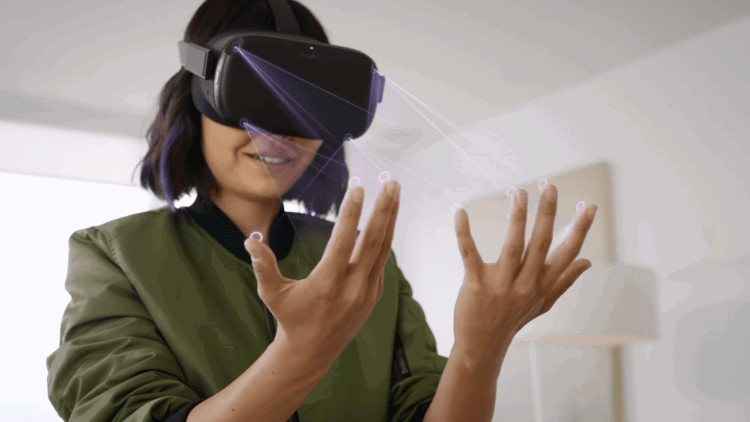The wireless Oculus Quest is about to be controller-less too. Announced at Oculus Connect 6 earlier today, the all-in-one VR headset is getting hand tracking support in the near future.
In early 2020, Quest owners and developers will be able to try the experimental new feature, and VR devs will be able to build games and experiences that don’t require the use of Oculus Touch controllers. The tracking utilizes the cameras already onboard the Quest which are currently used for the system’s inside out tracking. No additional cameras or sensors will be required. If you want to read more about the complex tech behind hand tracking, you can check out this blog post from the development team.
Eliminating the need for controllers makes the Quest even more “pick up and play” than it already is. Pretty soon, all you’ll have to do is put on the headset and get going without any wires and without any controllers. Of course, hand tracking won’t get rid of the Oculus Touch controllers entirely, but the technology will add another layer of freedom onto an already liberating device. Media streaming apps like Netflix in VR will become so much easier to use without controllers, and you won’t have to get your Touch controllers out if you’re traveling on a plane or something.
This, combined with other recent Quest developments like Oculus Link which allows you to play PC games on your Quest, combats the main drawback of choosing a Quest over other VR headsets: a lack of options. Choosing a standalone headset originally meant that you were locked into that ecosystem and couldn’t enjoy any content from other sources, but being able to transform your Quest into a PCVR headset tears down that barrier, and being able to use your hands instead of Touch controllers is just another option on top of that. What was once the most limited VR headset on the market will soon become one of the most versatile.
Strangely, there was no mention of the Oculus Rift S, the more powerful sister device to the Quest, getting support for hand tracking despite it using the same cameras and tracking solution. With both devices being priced the same, the Rift S was seen as the device for those who wanted a more powerful tethered experience while the Quest was an entry-level system for those who wanted to sacrifice power for portability and convenience. With the Quest becoming able to play PC games thanks to Oculus Link and the headset getting exclusive features like hand tracking, the Rift S is in a weird spot considering the Quest will soon be able to do everything it does and more, all for the same price.
Hand tracking will be available on Oculus Quest in early 2020 as an experimental feature that users must opt-in to. If you’re still on the fence about getting into VR, check out our review of the Oculus Quest, which we still believe is the best VR headset out there.


